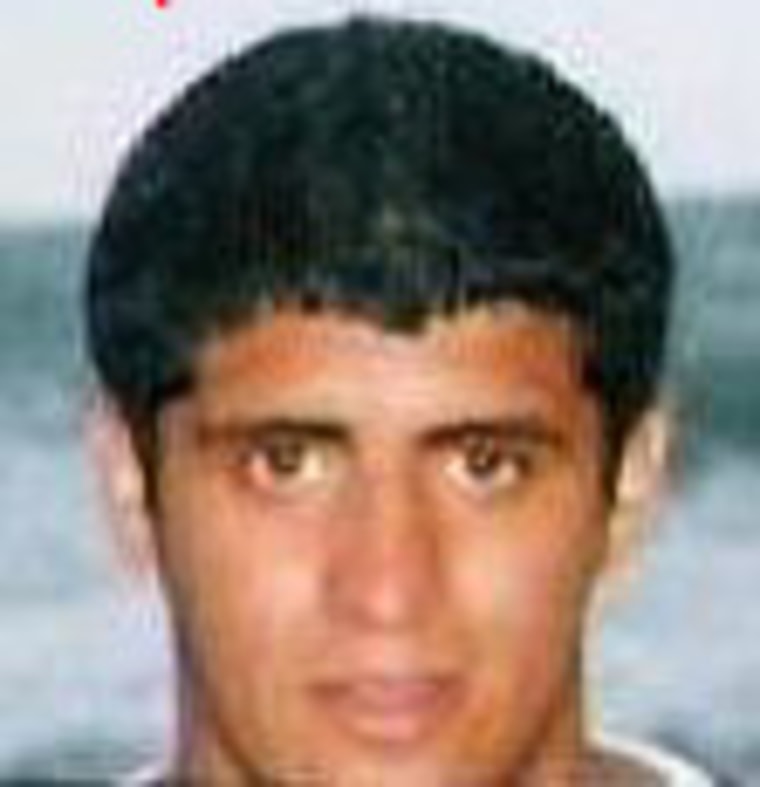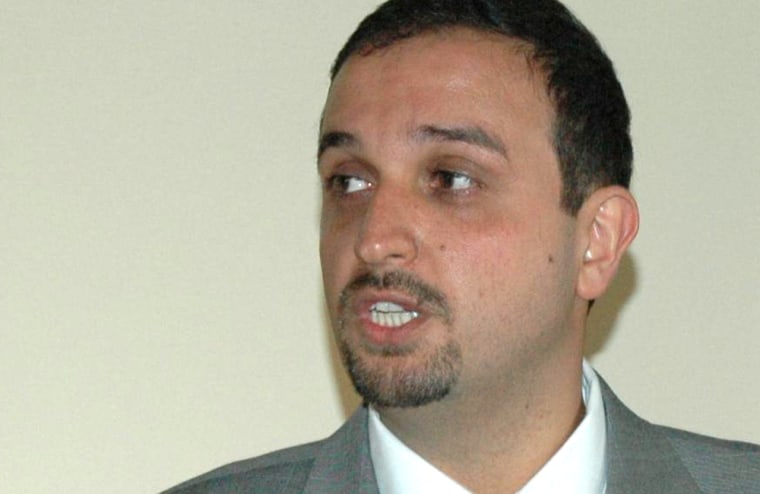Amid international criticism ignited by a crusading journalist, Iran’s chief justice has spared the life of a young man who had been sentenced to be executed as the result of a cousin’s accusations of homosexual acts years earlier.
Ayatollah Seyed Mahmoud Hashemi Sharudi nullified the imminent death sentence of Makvan Mouloodzadeh, 21, for violations of Iranian law and Islamic teachings, Saeid Eghbali, the defendant’s attorney, told msnbc.com this week.
Had Sharudi not intervened, Mouloodzadeh would have joined hundreds of his fellow Iranians, some of them just children when they committed their alleged crimes, who are hanged each year in jail yards and public squares. The executions are often carried out via a method designed to enhance and prolong their suffering: A rope is placed around the condemned person’s neck and he or she is hoisted from the ground with an industrial crane.

“This is a stunning victory for human rights and a reminder of the power of global protest,” said Paula Ettelbrick, executive director of the New York-based International Gay and Lesbian Human Rights Commission, which worked to draw attention to Mouloodzadeh’s case.
With overtones of homophobia, suspicions of political retaliation and a conviction based on activities that allegedly occurred eight years earlier, when Mouloodzadeh was just 13, his case captured the attention of a number of international groups that are trying to pressure Iran into improving human rights for women, gays and children.
The groups charge that Iran has increasingly used the death penalty for people convicted of crimes that occurred when they were children or teens.
“Iran leads the world in executing children,” Human Rights Watch said in a summer press release that charged the nation with putting to death at least 17 juvenile offenders since the beginning of 2004, “eight times more than in any other country in the world.”
By comparison, according to statistics compiled by Amnesty International, Sudan executed two juvenile offenders in the same time period, while China, Pakistan, Yemen, Afghanistan and Saudi Arabia executed one each. The United States last executed a person for crimes committed as a juvenile in 2003, but is second only to Iran in such killings since 1989, having put 19 juvenile offenders to death to Iran’s 24 in that 18-year period.
Mouloodzadeh’s case came to light through the reporting of Mitra Khalatbari, a 21-year-old journalist who works for a Tehran newspaper and publishes a Persian-language blog called “Scream of Silence.”
It is a stark reminder of the differences between Western justice systems and those of Islamic nations, which consider adultery and homosexuality to be capital crimes, mandate precise numbers of whip lashes for certain offenses, allow relatives of a murder victim to decide whether the killer is to be put to death or pay them blood money, and place a higher value on the lives of Muslim men than non-Muslims and women.
In a telephone interview with msnbc.com that was translated by Hossein Alizadeh, a spokesman for the gay and lesbian rights group, Khalatbari said Mouloodzadeh’s trial “took place behind closed doors” in June. Because of her reputation for previously covering such cases, she learned about Mouloodzadeh’s death sentence afterward from his uncle, who lives in Germany.
Through interviews with family members and others, Khalatbari learned that Mouloodzadeh, from Kermanshah province in the north of Iran, was arrested without warning in September of last year. Mouloodzadeh, who at first believed that he had violated prohibitions against smoking or something else during the holy month of Ramadan, had his head shaved and was paraded through town on a donkey, a state-sanctioned humiliation ritual.
Mouloodzadeh’s family was later informed that he had been accused of numerous acts of rape and sodomy, which allegedly occurred when he was 13. The allegations were made to authorities in a letter from Mouloodzadeh’s cousin.
Attorney: No victims until police rounded them up
“That was the statement, in that letter, that triggered the whole arrest,” said Eghbali, whose interview with msnbc.com also was translated by Alizadeh. Even with the letter, the attorney said, there were no alleged victims until the police went out, arrested some men and coerced them into saying that they had committed sodomy with Mouloodzadeh as youngsters.
Even though none of the men ever alleged that Mouloodzadeh raped them and all eventually recanted their stories that any sexual contact had occurred, a local magistrate used a legal maneuver called “knowledge of the judge” to find Mouloodzadeh guilty anyway and sentence him to death, a fate upheld by Iran’s Supreme Court, Eghbali said.
“This is a scandal, a judicial scandal, because they just decided on the basis of pretrial information to pass the sentence,” said Eghbali, who noted numerous other procedural errors in a 10-page appeal to Ayatollah Sharudi.
Although the Islamic Penal Code, which is the law of the land in Iran, mandates the death penalty for homosexual acts, it also establishes an elaborate procedure to prove such cases. “If you want to follow the letter of the law, it is next to impossible to sentence someone to death based upon sexual crimes,” Eghbali said.
The case simply didn’t add up to Eghbali, who would not comment on suspicions raised elsewhere that Mouloodzadeh may have been singled out because he had relatives who have opposed Iran’s rulers politically. “What I can tell you as a lawyer is that Makvan was not tried as an innocent person until proven guilty,” Eghbali said. “From the get-go, they decided to build a case around his personality and introduce him as someone who is nothing but trouble.”
In New York, a spokesman with the Iranian Mission to the United Nations would not comment on Mouloodzadeh’s case.
Now that the death sentence has been commuted, the case will be returned to the local court for retrial, Eghbali said, although the timetable is unclear. Eghbali said he had not spoken with Mouloodzadeh since the young man learned of his reprieve but planned to travel soon to the Kermanshah jail to discuss the case with his client.
Alizadeh, of the International Gay and Lesbian Human Rights Commission, said Mouloodzadeh was fortunate that journalist Khalatbari was able to write about his case.
“The only reason this young man managed to escape is that he had a relative in Germany that knew someone in Iran and that someone was a reporter and she was brave enough to make a fuss about it,” he said. “I’m sure there are many people like him who die because there was no one to hear their story.”

Many of those people, Alizadeh said, are gay, women, religious minorities or ethnic minorities. Mouloodzadeh, for instance, is Kurdish, the ethnic group that faces more discrimination than any other in Iran, said Alizadeh, himself a native of the country.
Khalatbari said she was “100 percent certain” that attention on the case swayed the ayatollah. “The judiciary and government is very sensitive to pressure, especially international pressure,” she said. “Sometimes, when a reporter finds out and starts making a fuss, they cancel the executions.”
Internal conflicts
The case also highlights the Islamic republic’s internal conflicts on how to deal with homosexuality.
Iranian President Mahmoud Ahmadinejad garnered headlines on a recent visit to the United States when he skirted a question on the execution of gays in Iran, declaring, "In Iran we don't have homosexuals like in your country." But this week, the Times of London quoted Mohsen Yahyavi, a member of the Iranian Parliament, as saying that gays should be executed or tortured.
Alizadeh says the government often tries to avoid appearing as if it is executing citizens just for being gay by adding other criminal charges, such as drug trafficking or rape.
Some observers remain convinced that such was the case with Mahmoud Asgari and Ayaz Marhoni, whose 2005 public hangings while they were still teenagers sparked worldwide outrage. While the pair was convicted of rape in addition to homosexual acts, some gay rights activists believe the youths were executed merely for engaging in consensual sex. Other rights groups have chosen to focus on the fact that the hangings violate international treaties prohibiting the execution of minors, which Iran has signed.